#Vrije Universiteit Brussel
Text
VUB wants to evaluate professors in a new way in the fight against 'toxic leadership'
A translation of the part of the article addressing toxicity:
"[...]
Second remarkable statement in the summer interview: the VUB is thinking aloud about a new personnel policy in the fight against transgressive behaviour. Last year, the university opened at least five files involving intolerable behavior. The most famous case is that of Elke Van Hoof, the 'burn-out prof' whose entire team resigned because of dissatisfaction with her 'toxic leadership'.
Danckaert does not comment on Van Hoof in the conversation with BRUZZ, but nevertheless points out that some “underestimate their impact on how they come across to younger employees”. That is why he also thinks “that not all transgressive behavior is by definition intentional. Sometimes it also happens from the ambition to strive for scientific excellence.”
To relieve that pressure and stress - a common complaint among academics - Danckaert wants to tinker with the financing method. “In the current model, someone receives funding based on the number of publications and projects. In the future, the VUB wants to assess these quantitative parameters more at group level, less at individual level. That way it becomes a collegial responsibility and a collegial process, where everyone thinks about their contribution to the whole.”
By being assessed as a group, with each member focusing on their strengths and potential weaknesses being absorbed by colleagues, the rector hopes to introduce a new leadership culture. To be clear: this is a thinking exercise at the VUB, no concrete decision yet. If Danckaert wants to succeed in his aim, he will mainly have to seek external support, from the government, from scientific funds and from companies and financing sectors."
End of translation.
Comments:
From our experiences at the university, the goal of these pressured and stressed individuals is not scientific excellence but furthering their own career ahead of others', whether that undermines the scientific excellence of the project or not. They are, as the statement implies, hugely pressured by their superiors and in great competition with their peers; they are not blinded in the pursuit of scientific excellence.
If this action does ever happen we are hopeful it will change the culture at the university in the long term. So far still only empty placation from the university, though, with such heavy caveats on whether these changes are possible in the first place.
Also, as always we would like to see something done about the seemingly overt and accepted culture of sexual harassment and sexualization of students at the VUB. This seems to get lumped into transgressive behaviour, which (purposefully?) erases/de-emphasizes the sexual nature of most of the harassment that happens at the university.
Unlike most universities, the VUB does not have a policy against professors dating their current students. Adding this to their regulations would be a simple step that would protect students' academic experience and achievements. As it is now, students have no protection from sexual predation from professors; there is literally no recourse because it is not against any regulations. Complainants against Dries Tys were repeatedly told that he did not break university policy and the students had probably misinterpreted or overreacted to the situation. They were put into in-person one-on-one mediation with Tys and asked if they were sure they hadn't misunderstood. This in regards to a man who had dated students in the past, married one of his students, and continued to date students afterwards. Obviously the complainants just misunderstood his excitement for scientific excellence, though, right?
The problem continues: the VUB has purposefully tied its hands behind its back when it comes to the safety of its students.
#vub#vrijeuniversiteitbrussel#vrije universiteit brussel#brussels#bruxelles#brussel#belgium#university#student life#harassment#toxic#student safety
0 notes
Text
Discover the fascinating world of gravitational waves.

Each year, the B-PHOT Student Chapter celebrates the International Day of Light with their Light Night event. In this year’s edition, you will get the chance to be inspired by Professor Anja Boisen, from the Technical University of Denmark (DTU), who will discuss different biosensing techniques and how light is involved in drug delivery and monitoring.
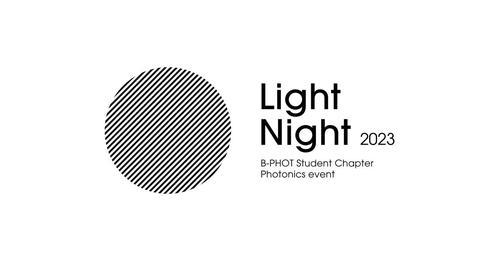
On top of that, this event will let you discover the fascinating world of gravitational waves via the lecture of Professor Michael Vervaeke and Professor Alexandre Sevrin, both affiliated to the Vrije Universiteit Brussel. Additionally, the B-PHOT Student Chapter will announce the winner of the Photo Contest 2023 at the end of the event, followed by a reception with drinks and food. Light Night 2023 will take place on the 18th of April from 18h to 22h at Pilar Box (VUB campus).
#Light Night event#Technical University of Denmark (DTU)#gravitational waves#belgium#Vrije Universiteit Brussel#Light Night
0 notes
Text

Diabetes-beating Betas
Interim results of a clinical trial of pancreatic precursor cells encapsulated in a device as treatment for Type I diabetes: analysis of resulting β cell function and control of glucose levels
Read the published research paper here
Image from work by Bart Keymeulen and colleagues
Diabetes Research Center, Vrije Universiteit Brussel and Universitair Ziekenhuis Brussel, Brussels, Belgium
Image originally published with a Creative Commons Attribution 4.0 International (CC BY 4.0)
Published in Nature Biotechnology, November 2023
You can also follow BPoD on Instagram, Twitter and Facebook
#science#biomedicine#biology#type 1 diabetes#diabetes#beta cells#pancreas#clinical trial#immunofluorescence
8 notes
·
View notes
Text
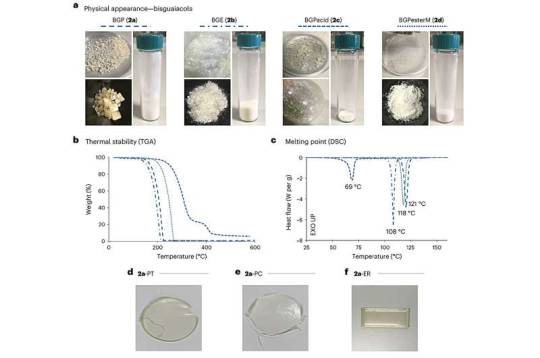
Using lignin and a catalyst to create an alternative to bisphenol A (BPA)
A team of microbiologists and chemists at the Center for Sustainable Catalysis and Engineering, working with colleagues from Vrije Universiteit Brussel, the Flemish Institute for Technological Research and Rheology and Technology (SMaRT), KU Leuven, all in Belgium, has developed a replacement for bisphenol A, a compound used to make plastics.
In their paper published in the journal Nature Sustainability, the group describes their lignin-based process and its performance. Bert Weckhuysen, with Utrecht University, has published a News & Views piece in the same journal issue outlining the work done by the team on this new effort. Also, the editors at Nature have published a Research Highlight report in the same journal issue summarizing the work.
Bisphenol A (BPA) is a synthetic, organic compound that is used to make a wide variety of polymers and epoxy resins, which means that it is used to produce different kinds of plastics. When used in such a fashion, it remains in the finished product. Prior research has shown that in some products, BPA can be released during use, such as when drinking from a plastic bottle, and it is also released when the material is heated.
Read more.
12 notes
·
View notes
Text
Taiwan is seeking to open a representative office in the Estonian capital of Tallinn, drawing the ire of China, whose ambassador has threatened to withdraw from the Baltic country if the plan goes through.
Guo Xiaomei, the Chinese envoy, delivered the warning during a meeting with the chairman of the Estonia-China parliamentary group, Toomas Kivimagi.
China says the office would be a breach of its "one China" policy, which requires countries it has relations with to acknowledge that the People's Republic of China, and not Taiwan, is the legal representative of "China." Beijing also claims sovereignty over Taiwan, although the Chinese Communist Party government has never ruled there.
"We firmly oppose any form of official interaction between the Taiwan region and countries having diplomatic ties with China and oppose any action supporting Taiwan independence separatist forces," Chinese foreign ministry spokesperson Wang Wenbin said at Wednesday's regular press conference.
However, leaders in the country of 1.3 million people say the office, with functions limited to economic and cultural services—not diplomatic ones—does not violate its commitments to China. It would also reportedly be opened in the name of "Taipei" rather than "Taiwan"—which is considered less controversial.
"Estonia does not recognize Taiwan as a state. As part of the 'One China Policy,' we are not developing political relations with Taiwan," Estonian Foreign Minister Margus Tsahkna said in a statement shared with Newsweek.
"At the same time, we consider it important to boost relations in domains such as the economy, education, culture, relations between NGOs, and other similar fields. We also support Taiwan's participation in international life in areas of global importance, such as the fight against pandemics and Taiwan's attendance at the World Health Assembly," he added.
Due to Chinese pressure, Taiwan has not in recent years been allowed to join meetings of the World Health Organization's decision-making body, even as an observer.
Although the country values "a constructive relationship with Beijing," Tsahkna said it's also important to safeguard national values like democracy and human rights.
Estonia and Taiwan have "affirmed establishing an office is of great significance to strengthening bilateral exchanges, but we have not yet reached a consensus," Taiwanese Foreign Ministry spokesperson Jeff Liu told Newsweek on Thursday.
Liu said he had no comment on the China's relationship with Estonia.
Estonia isn't the first Baltic country to draw China's ire over a Taiwan office. After Lithuania allowed Taiwan to open one in 2021, Beijing hit the country with tariffs, including secondary sanctions on companies from third countries, like Germany, that sourced Lithuanian parts for their products.
The move didn't have the desired effect. Lithuania had limited exposure to the Chinese economy due to a relatively low amount of bilateral trade.
In addition, the European Union rallied around its member. The 27-country bloc accused China of "coercion" and asked the World Trade Organization to intervene.
"Lithuania's decision to turn to Taiwan, away from China, set a precedent for its Baltic neighbors facing similar threats from China—and Russia. But the EU's response to Beijing's coercion against Lithuania also set a precedent for joint EU-level response to coercion, sending a message to Beijing that the bloc is ready to protect the interests of its member states against external pressure," Zsuzsa Ferenczy, a former political adviser to the European Parliament and an associate researcher for Belgian university Vrije Universiteit Brussel, told Newsweek.
Ferenczy said this resolve has only been strengthened in light of the support China has shown for Russia's invasion of Ukraine and that it's not in Beijing's interests to once again take serious action against an EU member on this issue.
"While Beijing will protest against any embrace of Taiwan, it has also been trying to rebuild the damage its coercion against Lithuania has done to EU-China ties. Beijing's response will tell whether it has learned from the lesson," she said.
When China issued its warning to Estonia, Taiwanese Foreign Minister Joseph Wu was in the country as part of a six-day tour of the Baltic states.
"We may be small, but a strong bond of democracies can make us mightier than we could ever imagine," Wu proclaimed in a speech in Tallinn on Wednesday.
6 notes
·
View notes
Text
"Ieri i nostri studenti hanno affrontato l'evento fondamentale del European Master in Disaster Medicine (EMDM). Questa grande simulazione si è svolta a Solbiate Olona (Varese, Italia) dove l' Esercito Italiano ha schierato un ospedale da campo RUOLO 3.
Nello scenario simulato di una pace instabile post-conflitto, un'improvvisa tempesta ha colpito un'area festival dove molte persone sono state riunite. I nostri studenti magistrali hanno fatto
del loro meglio per rispondere all'incidente di massa e coordinare tutte le forze che sono entrate in gioco per gestire la pressione di un ospedale già stressato e salvare più vite possibili.
Grazie infinite al Comune di Solbiate Olona che ci ha ospitato, ai 150 studenti di medicina che hanno svolto il ruolo di vittime intelligenti e alle centinaia di professionisti e volontari dei Vigili del fuoco, AREU Lombardia, Croce Rossa Italiana Varese e Novara, Protezione Civile e tanti altri.
Università del Piemonte Orientale
CRIMEDIM - Center for Research and Training in Disaster Medicine, Humanitarian Aid, and Global Health
VUB - Vrije Universiteit Brussel
Regedim - Research Group on Emergency and Disaster Medicine




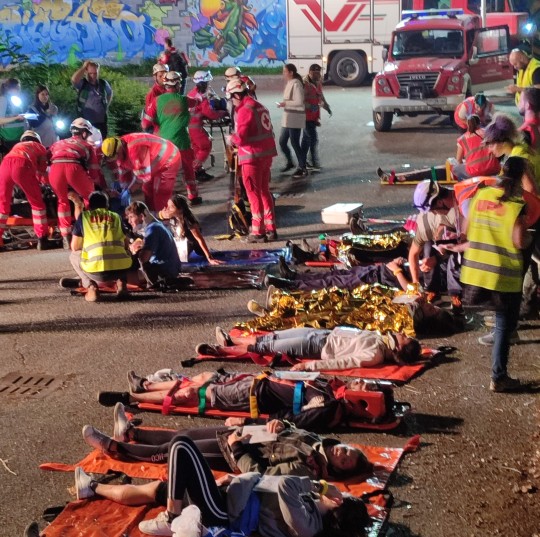
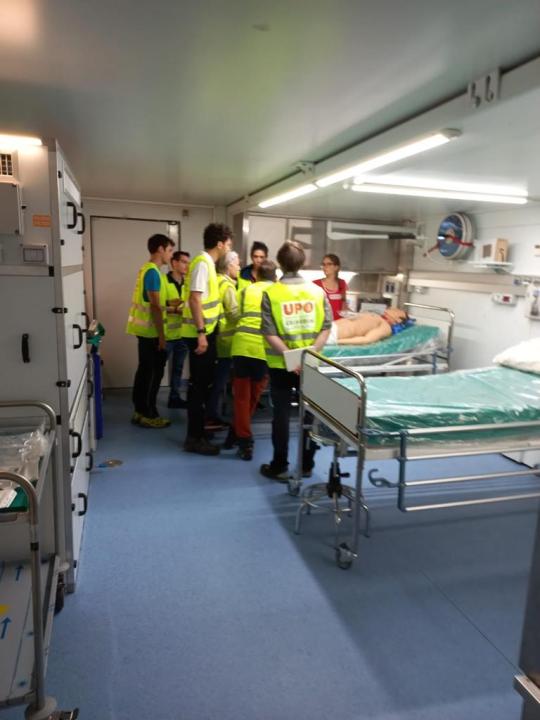



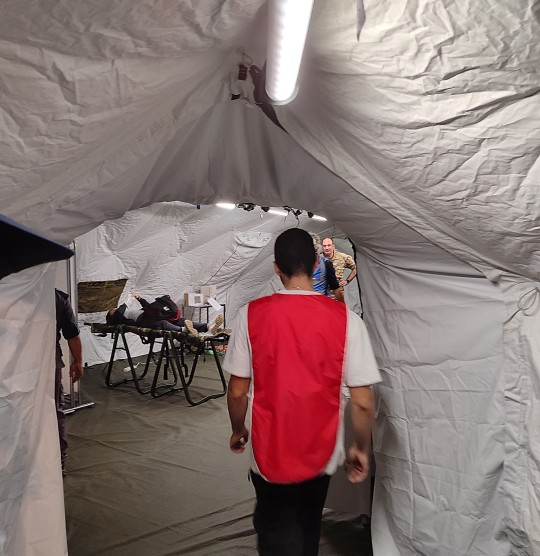

2 notes
·
View notes
Text
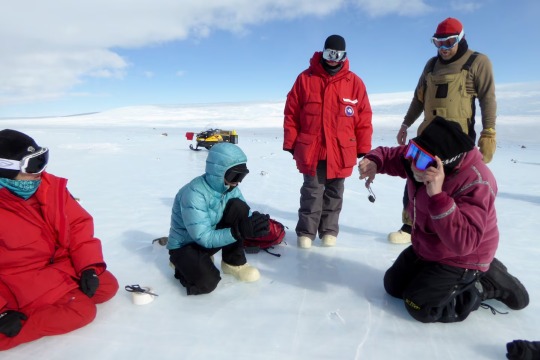
Members of NASA's Antarctic Search for Meteorites (ANSMET) Antarctic expedition examine a newly discovered meteorite in 2015. The icy continent helps preserve these former space rocks, allowing scientists to learn more about the conditions that exist in the solar system. Photograph By CindyEvans, NASA
Antarctica Holds a Treasure Trove of Meteorites. Why Are They Disappearing?
Warmer Temperatures Threaten Relics of the Solar System in Antarctica, a New Study Shows.
— By Theo Nicitopoulos | April 08, 2024
Nearly 50,000 meteorites have been found in Antarctica and hundreds of thousands more could be recoverable. Each one tells a story of the solar system’s evolution—the first lunar rock found on the icy continent showed that material from celestial objects larger than asteroids could end up on Earth.
Finding them isn’t easy, though, and requires teams to visit remote areas with no guarantee that any will be visible. Currently, scientists find around 1,000 meteorites in Antarctica each year. But a new study published in Nature Climate Change estimates that about 5,000 are buried out of sight every year due to warming temperatures.
To estimate this change, scientists developed a model that identifies where meteorites might surface. They based those chances on factors such as snow cover, surface temperatures, how fast the ice flows, and the steepness of the terrain. Then, they ran simulations under different warming scenarios and found that meteorites sink out of sight below the ice as temperatures rise.
“This is a bit of an unexpected impact of climate change,” says co-lead author Harry Zekollari, a glaciologist at the Vrije Universiteit Brussel. “These places are below freezing, yet we are still profoundly affecting a very important archive of the solar system.”
The Challenging Hunt For Meteorites
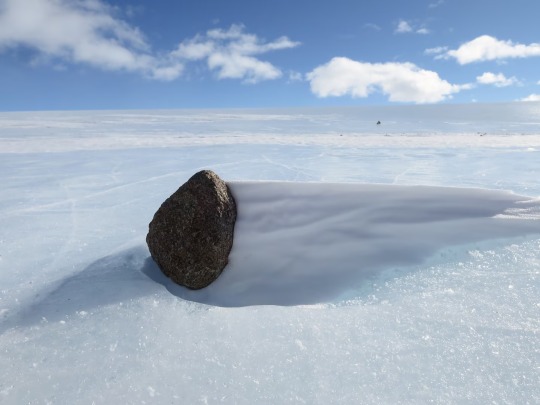
A Meteorite Found Atop a Field of Snow and Ice in Antarctica. Currently, Scientists find about 1,000 meteorites in Antarctica every year. But changing weather conditions may hide thousands more beneath the ice. Photograph By CindyEvans, NASA
The majority of Antarctic meteorites have been recovered near the base of mountains or outcrops where ice, which normally flows to lower elevations, is forced upwards. There, strong winds brush away snow, exposing ice that’s so old it appears as a bright, vivid blue. Instead of melting, some of the ice also changes directly to water vapor, helping to expose meteorites that otherwise would remain buried.
Meteorites at the surface can quickly disappear, though. When temperatures are well below freezing, the rocks can absorb enough of the sun’s heat to melt the ice, causing them to sink.
Then, subsequent refreezing renders the meteorites stranded in their melt-pockets, tucked out of sight.
“It’s very difficult to develop methods to find these meteorites,” says co-lead author Veronica Tollenaar, a glaciologist at the Université libre de Bruxelles. “That’s why we speak of meteorites being unrecoverable.”
Based on the expected warming under current policies, the team’s computer simulations showed that about one-third of visible meteorites will sink under the ice before the end of this century. This translates to a total loss of between 80,000 and 250,000 meteorites.
Losing the History of the Solar System
The list of Antarctic meteorites also includes samples from Mars: The most famous, ALH 84001 contains minerals that support evidence that the Red Planet was warm and had water on its surface billions of years ago.
The ice sheet’s meteorites also contain materials that were once “free-floating bits of dust in the early solar system,” says Sara Russell, a meteorite expert at the Natural History Museum in London.
These rocks often contain minerals that have been altered by water that melted from ice they once contained in space. By studying these altered rocks, researchers can study how asteroids colliding with Earth may have supplied the water molecules that formed our planet’s oceans billions of years ago.
Meteorites also provide information about other processes that may have taken place early on; for example, whether Jupiter’s immense gravity prevented materials from different regions of the solar system from mixing together.
Antarctic meteorites are also the least weathered space rocks on Earth. The cold, dry environment helps preserve them. As a result, scientists are confident that their materials represent conditions that existed in the solar system when they formed.
The samples also include unique rocks that haven’t been found elsewhere, says Russell.
These could be from new types of asteroids or pieces from familiar kinds that haven’t made it to Earth before, showing how diverse the population of such celestial objects are.
The Race to Find Antarctic Meteorites
Finding more meteorites before they disappear is not an easy endeavour, though, and ultimately requires “getting some boots on the ice to go looking for them,” says Ralph Harvey, a planetary scientist at Case Western Reserve University.
Harvey adds that “the type of work the researchers of the new study are doing is perfect for extending the limits of where meteorites might be found and showing how these places may be changing.”
Zekollari says that certain areas where the study predicts meteorites will disappear more quickly should be prioritized.
“We don’t have a lot of time,” adds Tollenaar. “We need to go with more people to more places to recover the relics.”
#Science#Antarctica 🇦🇶#NASA#Members of NASA's Antarctic Search for Meteorites (ANSMET)#Treasure Trove | Meteorites#Warmer Temperatures#Threat | Relics | Solar System | Antarctica 🇦🇶#Challenges#Meteorites | Climate Change | Solar System | Asteroids ☄️
0 notes
Text
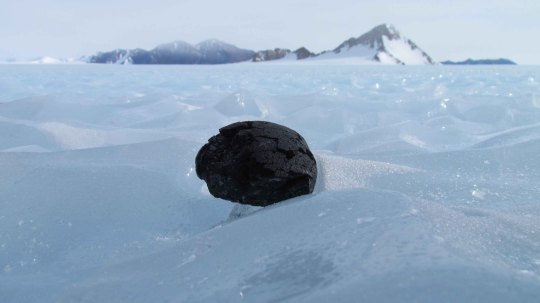
Antarctic meteorites threatened by climate warming
Antarctica harbors numerous large meteorite concentrations at its surface, and as such, the icy continent contains an unparalleled wealth of information on our Solar System, enabling us to understand, for example, the emergence of life on Earth, and how the Moon was formed.
A study carried out by scientists from the Université Libre de Bruxelles, ETH Zurich, WSL Birmensdorf and Vrije Universiteit Brussel highlights a rapid disappearance of meteorites due to global warming, a loss with far-reaching consequences for our understanding and knowledge of extraterrestrial life.
Using artificial intelligence to combine satellite observations of the continent with climate model projections, the scientists calculate that for every tenth of a degree of increase in global air temperature, 5,100 to 12,200 meteorites are lost from the surface of the ice sheet. By 2050, about one quarter of meteorites will be lost, and this can rise to three quarters by the end of the century, depending on future greenhouse gas emissions.
Veronica Tollenaar, PhD researcher (FNRS) at the Laboratoire de Glaciologie (GLACIOL), Faculty of Science - ULB, who co-led the study explains that "even when temperatures of the ice are well below zero, the dark meteorites warm so much in the sun that they can melt the ice directly under the meteorite. Through this process, the warm meteorite creates a local depression in the ice and over time fully disappears under the surface. As atmospheric temperatures increase, the surface temperature of the ice increases, intensifying this process, since less heat from meteorites is required to locally melt the ice."
To date, it is estimated that at least 300,000 meteorites remain at the surface of the Antarctic ice sheet. The study reveals that due to the currently ongoing warming, each year about 5,000 meteorites are lost, outpacing the pace at which Antarctic meteorites are collected by a factor five.
Harry Zekollari, Department of Water and Climate (VUB) and Laboratoire de Glaciologie (ULB)who co-lead the study, urges the need for a major international effort : “To secure this invaluable extraterrestrial material, we need to intensify and coordinate the recovery of Antarctic meteorites before we lose them to climate change. In similar efforts as collecting ice cores from vanishing glaciers or sampling coral reefs before they bleach, our study identifies the loss of meteorites as an unexpected impact of climate change upon which we need to act".
0 notes
Text
Researchers from the Department of Chemical Engineering at the Vrije Universiteit Brussel, Riga Technical University and the MESA+ Institute at the University of Twente have succeeded in arranging very small particles (10 µm to 500 nm, 10 to 100 times thinner than a human hair) in a thin layer without using solvents. This is a hugely important first step towards developing a new generation of sensors and electronics for a wide range of applications.
1 note
·
View note
Text
Overly emotional students or VUB’s culture?
“I have never seen so many professors make their students cry. And everyone acts like it’s normal. For me it is not normal.”
-anonymous masters student at the VUB
#vub#vrije universiteit brussel#harassment#shareyourstory#anonymous#workingforasafefuture#belgium#vrijeuniversiteitbrussel#Brussel#Brussels#bruxelles#professors#students
0 notes
Text
Fwd: Graduate position: VrijeU_Brussel.EvolutionFrogSexChromosomes
Begin forwarded message:
> From: [email protected]
> Subject: Graduate position: VrijeU_Brussel.EvolutionFrogSexChromosomes
> Date: 23 August 2023 at 07:17:17 BST
> To: [email protected]
>
>
>
>
> 6-year (Dutch-speaking) PhD research/teaching fellowship is available
> at Vrije Universiteit Brussel (Brussels, Belgium) in evolution of frog
> sex chromosomes
>
> We are seeking a PhD research/teaching position, funded by Vrije
> Universiteit Brussel and ERC Starting Grant, to join the Evolutionary
> Genomics of Sex lab (https://www.wmalab.com) in the Biology Department
> (https://ift.tt/VT1FtHe) at the Vrije Universiteit
> Brussel. As the teaching is involved in bacholar Biology courses, so
> fluent Dutch speaking is required for this position.
>
> Job vacancy link:
> https://ift.tt/xg9NVGb
>
> Research topics in the Ma lab:
> We are interested in how sex chromosomes evolve, and why the evolutionary
> trajectories of sex chromosomes differ dramatically across eukaryotes. For
> example, sex determination is very labile in reptiles, amphibians and
> fishes but highly stable in mammals and most birds. We study the drivers
> of sex chromosome recombination suppression, the genomic signature, and
> the evolution and genomic basis of sex determination and endosymbionts
> manipulation of host reproduction. We integrate comparative and functional
> genomics, transcriptomics, molecular genetics, artificial selection,
> and fieldwork sampling to reveal the genomic signature and genetic
> architecture of sex.
>
> The PhD topics are covered:
>
> Evolution of sex differences Evolutionary forces driving frogs to keep
> changing their sex chromosomes, in contrast to stability in mammals and
> birds How does frogs sex chromosome diversity originate and evolve?
>
> You will gain experience in:
>
> Field sampling (Europe and Central America) Phylogenetics/phylogenomics
> Genetic linkage mapping State of the art OMIC approaches (DNA sequencing,
> RNA sequencing RAD sequencing)
>
> The ideal candidate:
>
> Has background in evolutionary biology Is highly motivated by
> evolutionary questions Is eager/passionate to learn (new) genetic/genomics
> techniques/analysis Has great communication skills and is a team player
> Shows initiative to drive the project
>
> Application files:
> 1) a cover letter expressing your interest, your qualifications for the
> position, and your future career goals,
> 2) your CV,
> 3) a copy of your master degree diploma and master transcripts,
> 4) names and contact information of 2-3 professional references.
>
> Application deadline:
> 31 August 2023
>
> Please apply for this position via the VUB link:
>
> https://ift.tt/xg9NVGb
>
> Informal scientific enquiries can be emailed to Wen-Juan Ma
> ([email protected]).
>
>
> Dr. Wen-Juan Ma
>
> Assistant Professor
>
> Vrije Universiteit Brussel
> Room 5F.60
>
> Pleinlaan 2
> 1050 Brussels
> Belgium
>
> Office: 0032 (0)2 629 3416
> Lab webpage: http://www.wmalab.com
> Twitter: @WenJuanMa84
>
> Wen-Juan Ma
0 notes
Text
Support, Anthropological Linguistics; Applied Linguistics; Sociolinguistics; Multiple Languages: PhD, Vrije Universiteit Brussel, Belgium
ICYMI: Postgraduate scholarship (PhD seed funding) in French and/or Creole sociolinguistics at Vrije Universiteit Brussel
Faculty of Languages and Humanities
Brussels Centre for Language Studies
Duration:
1 year (100%) with the objective to develop and submit a funding request for a PhD project.
The scholarship provides funding for one year in order to give a recent MA graduate the opportunity to develop their own research project. Within the one-year period, the candidate will draft a proposal and su http://dlvr.it/SpMJBB
0 notes
Text
A 71-year-old man from Liège who donated sperm for scientific research as a student in Brussels in the 1970s has discovered he has at least two children who were conceived without his knowledge. His biological son contacted him after finding a match through the commercial MyHeritage DNA database. This is not the first time the VUB professor who supervised the research has been discredited.
The man was given a DNA test through MyHeritage as a gift by his wife several years ago, but it unexpectedly revealed one significant match. At first he thought it was a child from a past relationship that he hadn’t known about, until a second match was revealed.
That person, Tom (not his real name), had registered with the database because he was looking for his biological father. Commercial databases compare users’ DNA profiles to find matches. The greater the match, the closer the users are genetically related. Tom sought contact and informed the man that he had been conceived using donor sperm.
When Tom didn’t receive an answer, he asked Steph Raeymaekers of the non-profit support organisation Donorkinderen to contact the man on his behalf. After VUB professor Robert Schoysman was mentioned, the 71-year-old realised what must have happened.
“He is very worried that the two children he has now found are only the tip of the iceberg,” says Raeymaekers. Between 1974 and 1979, when he was studying at the Vrije Universiteit Brussel, he donated sperm four times a month, as part of a study by Schoysman on male fertility.
“He thought he was contributing to science and received some payment for it,” Raeymaekers says. “To find that people were conceived with his sperm against his will and without any knowledge is incredibly difficult for him to accept.” Students were paid 1,000 Belgian francs (€25) per donation
Schoysman, who has since died, was a pioneer of in vitro fertilisation and donor insemination in Belgium, but has previously come under scrutiny. Donorkinderen claims that, among other things, he helped conceive triplets by insemination with a mixture of two men’s sperm.
'Scandals are not exceptions'
The organisation is calling for an investigation and is concerned that many more students were misled. “We want the government to act because the scandals out there are no longer exceptions,” Raeymaekers says.
“How long did this professor do that? How many students were involved? How many parents and also donor children were affected by him? We need to find that out in order to correctly inform victims.”
Tom, 45, signed up to MyHeritage because he is a carrier of a genetic disorder. “There is a 50% chance that I inherited it from him,” he says. “I felt I should let him know that so that his other children can also get tested. For me personally, it’s a closed chapter. I have answers to my questions. But I think raising awareness in society is important. I realise there are still a lot of children who probably don’t know they are donor children.”
Although fertility centres and sperm banks retain donors’ personal details, they may not disclose them to prospective parents or children. Tom is in favour of lifting that anonymity, as is the case in the Netherlands, where children have the right to details of their donor father.
In a press release, the VUB said: "The facts quoted seem to date back to the early 1970s. At that time, reproductive medicine was still in its infancy. Neither the VUB nor the UZ Brussel are currently aware of any publications by Prof Schoysmans in the context of scientific research on sperm donors.
"VUB-UZ Brussel has strict procedures for donors and clearly communicates the reason why. A contract is signed with the sperm donor for each donation. Specific informed consent is required for use of sperm cells in the context of scientific research."
5 notes
·
View notes
Text
La #pollution #lumineuse, l’autre fléau qui anéantit les #insectes dans l'indifférence générale
À la ville comme à la campagne et même jusque dans les forêts, les insectes disparaissent. Et des chercheurs de la Vrije Universiteit Brussel (Belgique) expliquent aujourd’hui une partie d
0 notes
Text
Antibiotic resistance testing with a quick, cheap, and simple method
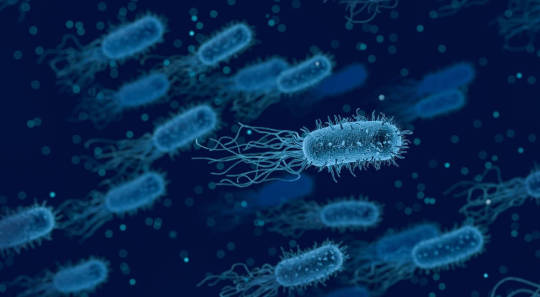
- By Nuadox Crew -
EPFL and Vrije Universiteit Brussel researchers have developed a low-cost and quick antibiotic sensitivity testing (AST) method that can detect resistance in bacteria in two to four hours.
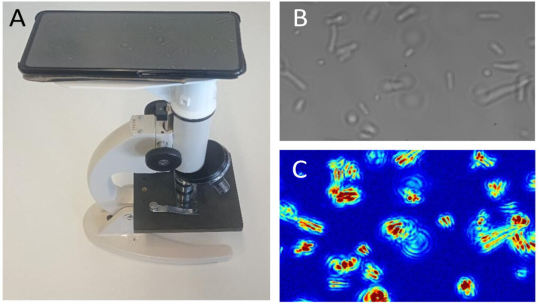
Image: A. Optical Nanomotion Detection based antibiotic susceptibility test setup: a low-cost optical microscope and a mobile phone are sufficient. B. E. coli bacteria optical image. C. The same field of view as in B, but with false colors that highlight bacterial displacements: red indicates high amplitude motion, blue indicates no displacement. Credit: Ines Villalba (EPFL).
The method, named optical nanomotion detection (ONMD), involves monitoring the nanoscale vibrations of single bacterial cells before and after they are exposed to antibiotics.
It requires no attachment or labeling of bacteria and only needs a basic, conventional optical microscope, a camera or mobile phone, and dedicated software.
In less than two hours, the researchers were able to detect the antibiotic sensitivity of various bacteria (instead of the current 24 hour period for the most common germs and one month period for tuberculosis).
--
Source: Ecole Polytechnique Fédérale de Lausanne (EPFL)
Full research: Villalba, Maria I. et al, Simple optical nanomotion method for single-bacterium viability and antibiotic response testing, Proceedings of the National Academy of Sciences (2023). DOI: 10.1073/pnas.2221284120
Read Also
New device offers faster way to detect antibiotic-resistant bacteria
#antibiotics resistance#antibiotics#medtech#health tech#imaging#health#medicine#biology#bacteria#microscope
0 notes
Text
Climate Change and Human Rights
An article entitled, "How Can We Overcome the Great Procrastination to Respond to the Climate Emergency?" by Rachel Hammonds points out the fragile relationship between climate change and human rights. Climate change will require us to drastically alter our normal way of life. It will affect each one of us, however, it will affect some more than others. For example, those on the frontlines may not have adequate access to healthcare services as the climate crisis worsens (Hammonds, 363).
The author utilizes logos to demonstrate key points that address the climate emergency such as creating a circular economy or taking an interdisciplinary approach "to integrate action on climate change and CO2 emissions into sustainable development" (Hammonds, 364). Additionally, Hammonds uses the first-person narrative to speak from her educational and professional experiences. This use of ethos adds credibility to her argument as she is an internationally recognized leader for human rights, and currently works for the World Health Organization. She studied law at the University of Ottawa and earned her PhD in Medical Science/Public Health from Vrije Universiteit Brussel.
Personally, I found the article quite interesting. I understand the argument that the climate crisis will result in a human rights crisis. Addressing the climate crisis is important now more than ever. We cannot procrastinate much longer.
0 notes